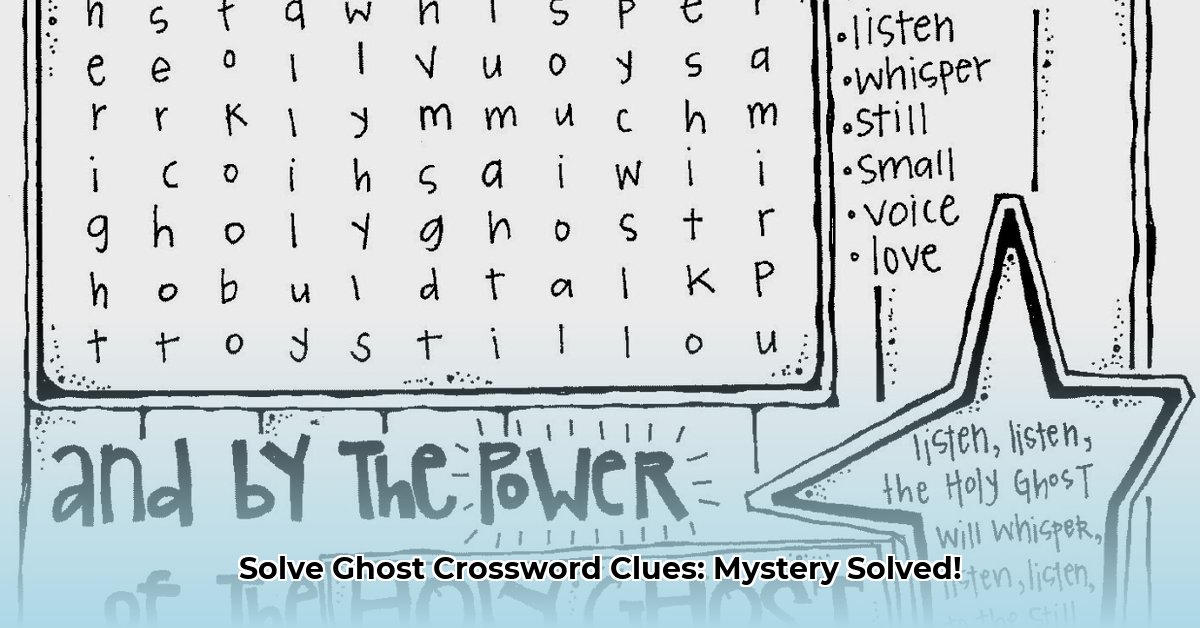Encountering the clue “Ghost” in a crossword puzzle can be a truly haunting experience! The word’s versatility and the puzzle’s cryptic nature can make it feel like an unsolvable enigma. But fear not! This comprehensive guide will equip you with the knowledge and strategies needed to confidently decipher these spectral clues and transform you into a “ghost” clue-solving expert. Prepare to banish your crossword frustrations and unlock the secrets to success. For even more tips, check out this helpful guide: Ghost Clue Guide.
Demystifying “Ghost” Crossword Clues
The challenge with “Ghost” clues stems from the word’s multiple meanings and synonyms. The answer could be anything from a simple “SPOOK” to a more elaborate “APPARITION,” “SPECTRE,” or even a figurative interpretation. Understanding this ambiguity is the first step toward mastering these perplexing clues, demanding sharp crossword solving techniques.
Consider “Ghost” not as a roadblock, but as an invitation to engage your logic, deduction skills, and creativity. Approach each clue as a unique puzzle, a mystery waiting to be unraveled. This guide provides techniques to sharpen your crossword puzzle strategies and turn you into a formidable crossword solver.
A Step-by-Step Guide to Cracking the Code
Here’s a structured approach to help you confidently tackle “Ghost” clues, armed with practical solving strategies:
Step 1: Decipher the Letter Count: Before brainstorming synonyms, determine the number of available spaces for the answer. This is your most crucial initial clue. For example, five letters might indicate “GHOUL” or “SHADE,” while nine letters could point to “APPARITION.” Pay close attention to ensure accurate crossword clue analysis.
Step 2: Leverage Intersecting Letters: Examine the letters from intersecting words. These act as spectral breadcrumbs, providing valuable constraints. If a “T” intersects your “Ghost” entry, possibilities like “SPOOK” are immediately eliminated. Use intersecting clues in crosswords to narrow your options quickly.
Step 3: Identify the Crossword Type: Determine whether you are dealing with a standard or cryptic crossword. Standard crosswords typically use direct synonyms, while cryptic crosswords employ wordplay, puns, or double meanings. In a cryptic puzzle, “Ghost” might allude to a hidden word or concept unrelated to its literal meaning. Accurately identifying the type enhances your crossword solving approach.
Step 4: Strategically Utilize Online Solvers: Online crossword solvers can be helpful resources, but exercise caution. Use them as a confirmation tool, not your primary solution method. Always verify that the solver’s suggestion fits both the letter count and any intersecting letters. Over-reliance can hinder your skill development. Employ crossword solver strategies wisely.
Step 5: Employ Logical Deduction: Combine the letter count, intersecting letters, and crossword type to systematically eliminate incorrect answers. Think like a detective, carefully weighing the evidence and narrowing down the possibilities until only the correct solution remains. This deduction process is a core element of effective crossword solving.
Step 6: Reflect and Learn: After successfully solving the clue, take time to analyze your process. What strategies were most effective? Where could you improve? Reflecting on your successes and challenges refines your skills and builds your confidence for future puzzles. Consistent reflection is key to long-term crossword improvement.
Advanced Techniques for Cryptic Crosswords
Cryptic crosswords elevate the complexity of “Ghost” clues with anagrams, hidden words, reversals, and other intricate wordplay. These require a deeper understanding of cryptic conventions and more practice to master, using advanced crossword solving techniques.
Consider clues that don’t explicitly mention “Ghost” but contain words or phrases which, when manipulated, reveal a synonym. For example, a clue like “Pale rider leaving hospital (6)” might lead to “SPECTER” (a pale rider is a common representation of death, and “leaving hospital” suggests removing letters). Developing a keen eye for these subtle cues is essential for cryptic success.
Expanding Your Crossword Vocabulary
A broad vocabulary is indispensable for tackling “Ghost” clues. Familiarize yourself with synonyms like apparition, phantom, spectre, wraith, shade, spook, ghoul, and bogeyman. Understanding related concepts, such as haunting, paranormal activity, and folklore, can also provide valuable insights. Consistent reading and vocabulary building will significantly enhance your crossword prowess.
Furthermore, pay attention to common crossword abbreviations and conventions. “ER” often indicates “Emergency Room,” while “St” typically represents “Saint” or “Street.” Recognizing these shortcuts can save valuable time and unlock otherwise impenetrable clues.
Beyond Synonyms: Figurative Interpretations
“Ghost” clues can sometimes extend beyond literal meanings. Consider figurative interpretations related to absence, memory, or unfinished business. For example, “Ghost” might refer to a faint trace, a lingering feeling, or a past event that continues to haunt someone. Thinking outside the box opens up new avenues for solving these challenging clues.
Practice, Persistence, and Patience
Solving “Ghost” crossword clues is a skill that improves with consistent practice. Don’t be discouraged by initial difficulties. Embrace the challenge, learn from your mistakes, and celebrate your successes. The more you practice, the more intuitive the process will become.
Embark on Your Ghost-Hunting Adventure
Solving “Ghost” crossword clues is not just about memorizing synonyms; it’s about developing a versatile problem-solving approach. With dedication, strategic thinking, and a willingness to learn, you can transform from a puzzled novice into a confident crossword solver. So, grab a pen, find a challenging crossword, and begin your ghost-hunting adventure! Embrace the challenge, enjoy the process, and revel in the satisfaction of cracking those spectral clues. Develop daily crossword strategies, and happy puzzling!
- Good Morning Images to Share with Loved Ones - January 10, 2026
- Handsome Good Morning Message for Him Long Distance to Make Him Smile - January 9, 2026
- Find the Perfect Good Morning Handsome Gif for Him - January 8, 2026










